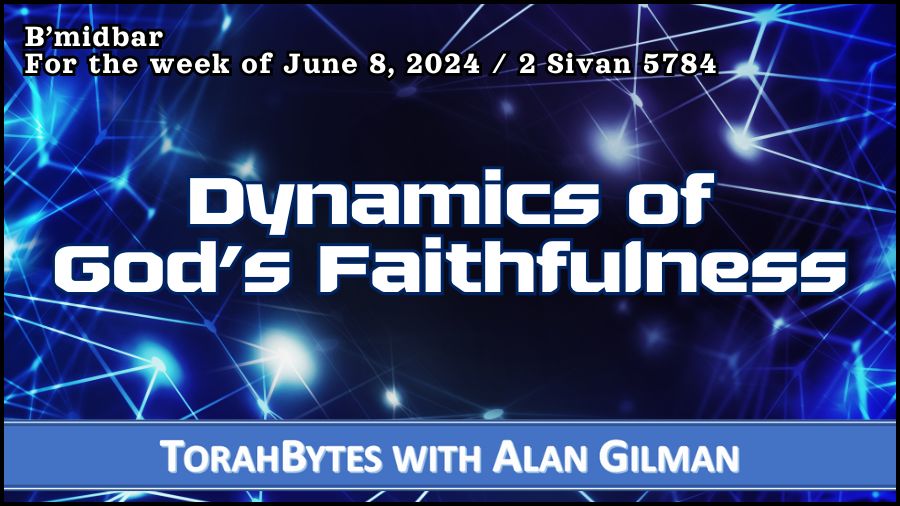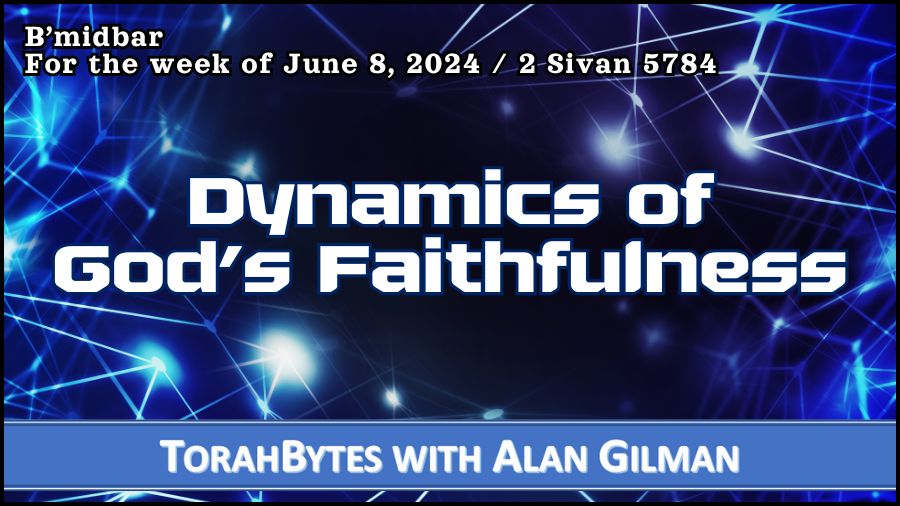
Dynamics of God’s Faithfulness
For the week of June 8, 2024 / 2 Sivan 5784

B’midbar
Torah: B’midbar/Numbers 1:1 – 4:20
Haftarah: Hos 2:1-22 (English: 1:10 – 2:20)
Yet the number of the children of Israel shall be like the sand of the sea, which cannot be measured or numbered. And in the place where it was said to them, “You are not my people,” it shall be said to them, “Children of the living God.” (Hosea 2:1; English: 1:10)
This week’s parsha (weekly Torah reading portion) is the beginning of B’midbar, the book of Numbers, which chronicles Israel’s almost forty years of wilderness wanderings. Such a duration was due to the people’s refusal to trust God when they were intimidated by the prospect of taking the land of Canaan. Throughout the book, we see the consequences of their lack of faith.
It is tragic when Bible readers fail to see themselves in the lives of the Israelites. Israel in the Bible functions as a prototypical people group. Scripture is to act like a mirror. Readers are supposed to see themselves in the lives of the people of Israel. Looking down on them for their tendency to mistrust God and stubbornly go their own way reflects great hypocrisy. Who would have done differently? Israel’s failure to live up to God’s standards was designed to show the whole world its need of God. Distancing ourselves from the ancient Israelites cuts us off from valuable scriptural lessons God longs for us to learn.
Core to those lessons is the essence of God’s faithfulness to his people. This week’s Haftarah (selected reading from the Prophets) is from Hoshea (English: Hosea). Few biblical books reflect the theme of God’s faithfulness as Hoshea does. God had called Hoshea to marry a wayward woman to demonstrate this. Throughout his book, as with the other prophets, we read very harsh words of judgment upon Israel. So much so that I could understand why some think God completely rejected them. But to come to such a conclusion, you need to be most selective in your reading. You would need to ignore what Hoshea says in what I quoted at the start:
Yet the number of the children of Israel shall be like the sand of the sea, which cannot be measured or numbered. And in the place where it was said to them, “You are not my people,” it shall be said to them, “Children of the living God” (Hosea 2:1; English: 1:10).
God’s commitment to Israel is so misunderstood that when Peter references this in his first letter, many assume he is speaking about Gentile believers rather than Messianic Jews:
But you are a chosen race, a royal priesthood, a holy nation, a people for his own possession, that you may proclaim the excellencies of him who called you out of darkness into his marvelous light. Once you were not a people, but now you are God’s people; once you had not received mercy, but now you have received mercy (1 Peter 2:9-10).
Confusion over God’s faithfulness is fueled by a misunderstanding regarding God’s unconditional covenant with Israel. Disobedience on Israel’s part in no way undermines God’s covenantal commitment to them. Individuals, even generations, may experience harsh judgment, but that doesn’t nullify God’s commitment to them. This then leaves the door open for individuals to return. Never in Israel’s history was anyone to regard the nation’s spiritual condition as an indication of God’s general posture toward them. On the contrary, reconciliation to God was always possible on the basis of God’s faithfulness to Israel. Not that his faithfulness was ever to be taken for granted. Reconciliation always requires repentance. And repentance requires an honest acceptance of our own inadequacy before God.
What holds true for Israel is available to all through Israel’s Messiah. Through his death and resurrection, people of all nationalities can be embraced by God’s faithfulness. He is ready to accept anyone who humbly comes to him through Yeshua.
Scriptures taken from the English Standard Version